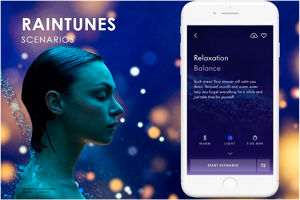Case study on agile innovation management with IP design at Hansgrohe: Digitization of a brand steeped in tradition
RainTunes was one of the digital highlights at the world’s leading trade fair focusing on the responsible management of water and energy in buildings, the ISH 2019 in Frankfurt/Main. It shows the trend of digitization for modern bathroom design and intelligent home systems. RainTunes is a digital shower system and connects water, light, sound and scent. No other product on this fair was as sharply focused on forward looking smart home experience in this conservative branch. RainTunes is not just a digital product from a traditional brand like Hansgrohe, it was developed in a show case process with agile innovation management based on IP design.
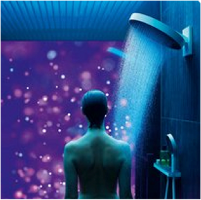 RainTunes is designed to create a holistic showering experience. It is focusing on the individual needs of human beings and its mood. Hansgrohe developed the product with experts from different fields to create digital showering scenarios which are balanced and aligned with individual everyday life. Right now, seven multi-sensory showering scenarios are available. They are aligned with individual daily routines, atmospheres and moods. These scenarios where developed with dermatologists, sport medicine specialists, physiotherapists and specialists for aromatherapy. Customers can choose between experiences like “good morning”, “recreation”, “vitality”, “relaxation”, “beauty”, “nature” and “good night”.
RainTunes is designed to create a holistic showering experience. It is focusing on the individual needs of human beings and its mood. Hansgrohe developed the product with experts from different fields to create digital showering scenarios which are balanced and aligned with individual everyday life. Right now, seven multi-sensory showering scenarios are available. They are aligned with individual daily routines, atmospheres and moods. These scenarios where developed with dermatologists, sport medicine specialists, physiotherapists and specialists for aromatherapy. Customers can choose between experiences like “good morning”, “recreation”, “vitality”, “relaxation”, “beauty”, “nature” and “good night”.
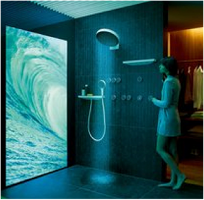 The app developed for this purpose connects to the shower products of Hansgrohe via the local WLAN network. Even systems docked via WLAN, which are already used in smart homes, can be used to control light and sound. With a tap of the app, the selected shower scenario is transferred to the shower and started there via a play button. RainTunes is controlled either via buttons or via a pad. The control buttons can be freely placed in the bathroom. They can be used to regulate the spray types, water quantity and temperature. Thanks to Bluetooth technology, a completely new operation of the shower could be realized: the separation of permanently installed fittings and the control. Because the control buttons are connected to a central unit behind the wall via Bluetooth and therefore independent of an armature. Of course, there is also the possibility to control the daily shower ritual on the pad individually. Temperature, amount of water musical background and spray characteristic can be changed at any time.
The app developed for this purpose connects to the shower products of Hansgrohe via the local WLAN network. Even systems docked via WLAN, which are already used in smart homes, can be used to control light and sound. With a tap of the app, the selected shower scenario is transferred to the shower and started there via a play button. RainTunes is controlled either via buttons or via a pad. The control buttons can be freely placed in the bathroom. They can be used to regulate the spray types, water quantity and temperature. Thanks to Bluetooth technology, a completely new operation of the shower could be realized: the separation of permanently installed fittings and the control. Because the control buttons are connected to a central unit behind the wall via Bluetooth and therefore independent of an armature. Of course, there is also the possibility to control the daily shower ritual on the pad individually. Temperature, amount of water musical background and spray characteristic can be changed at any time.
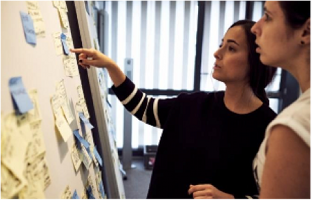 RainTunes was developed with agile innovation management. Agile project management such as design thinking and IP design is fundamentally different from traditional project management. In agile project management, there is a different emphasis on what a project should achieve and how. Not all project evaluation criteria of the traditional paradigm are given equal weight. Agile projects are characterized by a comparatively high tolerance when it comes to typical target variables such as scope, process, time and costs, and by significant client involvement. Agile project methods place a strong focus on deliverables and quality from the user’s perspective.
RainTunes was developed with agile innovation management. Agile project management such as design thinking and IP design is fundamentally different from traditional project management. In agile project management, there is a different emphasis on what a project should achieve and how. Not all project evaluation criteria of the traditional paradigm are given equal weight. Agile projects are characterized by a comparatively high tolerance when it comes to typical target variables such as scope, process, time and costs, and by significant client involvement. Agile project methods place a strong focus on deliverables and quality from the user’s perspective.
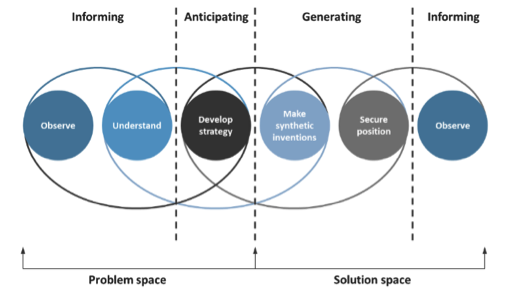 The RainTunes project focuses on redefining showering and what it means to customers: the move away from body care and personal hygiene to mental fitness, meditation, ritual retreats and short breaks from the stresses of everyday life. IP design leads to a permanent review cycle of the portfolio of options and scenarios for action and thus enables the company to evolve in the direction of different digital business models. Revision, adaptation and modification are therefore no longer a problem or a special case but reflect the actual purpose of IP design. IP design even takes into account scenarios which are undesirable from the company’s perspective and should be suppressed by IP. Even digital “night-mares” leading to disruption can be captured by patents without requiring those patents to be implemented.
The RainTunes project focuses on redefining showering and what it means to customers: the move away from body care and personal hygiene to mental fitness, meditation, ritual retreats and short breaks from the stresses of everyday life. IP design leads to a permanent review cycle of the portfolio of options and scenarios for action and thus enables the company to evolve in the direction of different digital business models. Revision, adaptation and modification are therefore no longer a problem or a special case but reflect the actual purpose of IP design. IP design even takes into account scenarios which are undesirable from the company’s perspective and should be suppressed by IP. Even digital “night-mares” leading to disruption can be captured by patents without requiring those patents to be implemented.
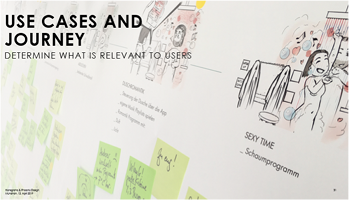 The RainTunes project also allows Hansgrohe to derive key success factors for design thinking and IP design. The pivotal role of the project partners in the progress of IP design requires highly effective communication. The project-based working methods of IP design are in line with today’s interconnected work environment characterized by flat hierarchies, transparent contributions and solution-oriented thinking. This applies in particular to the agile overall approach involving design thinking methods.
The RainTunes project also allows Hansgrohe to derive key success factors for design thinking and IP design. The pivotal role of the project partners in the progress of IP design requires highly effective communication. The project-based working methods of IP design are in line with today’s interconnected work environment characterized by flat hierarchies, transparent contributions and solution-oriented thinking. This applies in particular to the agile overall approach involving design thinking methods.
Therefore, a corporate culture is needed that recognizes the creative contributions of the team members and prioritizes the outcome over planning. The methodology itself must also be secondary to the outcome, and to the exclusive character of the business model and the customer experience.
The Product received an IF-Design award in gold
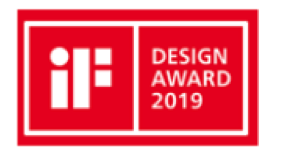
In Gold for the RAINFINITY Showering System
Authors of the case study:
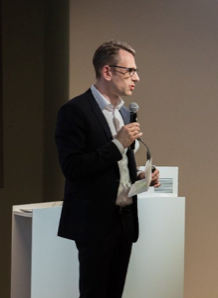 Frank Schnatz
Frank Schnatz
Frank Schnatz is a member of the Executive Board of Hansgrohe SE. In 2015 the graduate engineer and graduate industrial engineer came to the Schiltach-based fitting and shower manufacturer. Before that, Frank Schnatz held various management positions in production and management at home and abroad. Most recently, he worked for WMF AG, where he was Managing Director of the Silit brand and in March 2013 he additionally became Vice President of Production, Operations Strategy and Projects. Since 2015, he has been responsible for product development, production and quality management at Hansgrohe SE.
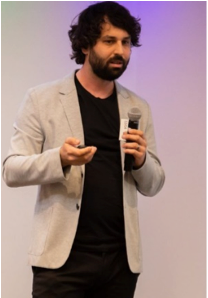
Steffen Erath
Steffen Erath is Head of Innovation at Hansgrohe SE and thus the creative innovation head of the Black Forest sanitary company. Under his leadership, radical ideas are spun and tested for feasibility and cost-effectiveness. With the establishment of the InnoLab, Steffen Erath has created a diverse, future-oriented working environment at Hansgrohe in which radical innovation projects can grow and become successful. The latest innovation, created under his leadership, is the Hansgrohe RainTunes. The graduate industrial engineer joined Hansgrohe in 2005, where he started as a product manager. The best thing about his job at Hansgrohe, he says, is the magic of the new.
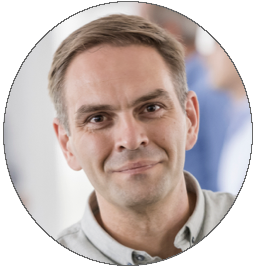
Andreas Diefenbach
Andreas Diefenbach(* 1979) is managing partner of Phoenix Design GmbH + Co. KG in Stuttgart. He completed his design studies at the Folkwang University of the Arts in Essen and at the State Academy of Fine Arts in Stuttgart and has been a member of the Phoenix Design Team for more than 10 years. As a specialist for the sanitary and investment industry, he looks after international brands in the design and innovation process. His expertise extends to business and strategy management. In addition, Andreas Diefenbach is responsible for the client management of national and international partners such as Hansgrohe, Duravit, Haier, Huawei, Interstuhl, Midea, Trumpf, Vorwerk and Zeiss. For many years, Phoenix Design has been ranked first in the iF ranking creative “design offices” of the iF Design Award and has received more than 750 design awards, including more than 400 in the last six years. Andreas Diefenbach is involved internally as a member of the Innovation & Academy Lab for radical innovations and design concepts. He is also active in lectures at the State Academy of Fine Arts and at the Hochschule für Gestaltung in Schwäbisch Gmünd. For lectures and workshops, he was booked amongst others by the Art Directors Club Germany, the German Design Council and the SAP UX Day. Andreas Diefenbach is married and has three children.
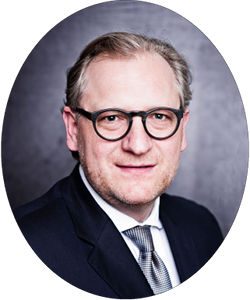 Prof. Dr. Alexander Wurzer
Prof. Dr. Alexander Wurzer
Dr. Wurzer is Adjunct Professor for IP Management at the Center for International Intellectual Property Studies (Centre d’Etudes Internationales de la Propriété Industrielle, CEIPI) at the University of Strasbourg, where he has been Director of Studies for the Master’s degree in Intellectual Property Law and Management (MIPLM) since 2007. Prof. Dr. Wurzer is Director of the Steinbeis Transfer Institute for Intellectual Property Management at Steinbeis University Berlin. He is Managing Partner at WURZER & KOLLEGEN GmbH, a consulting firm specializing in strategic IP management. Prof. Dr. Wurzer is Chairman of DIN committees DIN 77006 for quality in IP management and DIN 77100 for patent valuation. He is a member of the Board of Directors of “Deutsches Institut für Erfindungswesen e.V.” (D.I.E.), Spokesman of the Board of Trustees awarding the Diesel Medal, and Fellow at the Alta Scuola Politecnica at Milan/Turin Polytechnic. He was also a jury member for the 2018 German Innovation Award of the German Design Council and is a member of the group of experts of the European Commission.
MIPLM Case Study Hansgrohe

